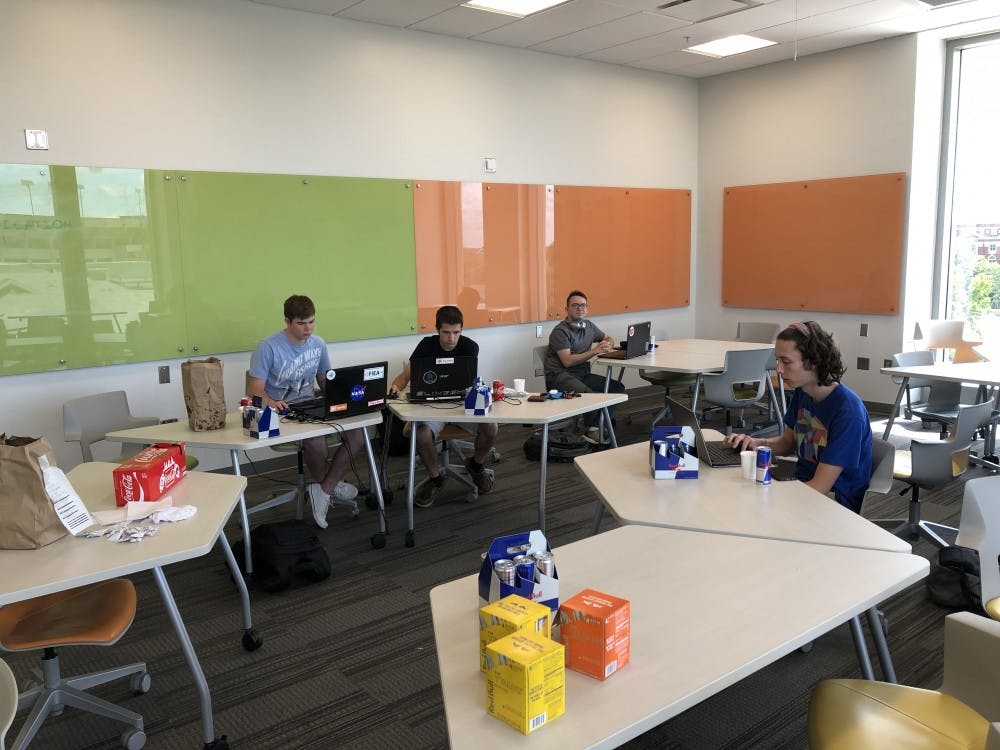For students with dreams of game development, TigerDev presents itself as a community and resource for improving skills in programming, art or sound design — or trying it out for the first time.
TigerDev is a group of students passionate about the development of video games. They learn about the facets of game development through competitive and cooperative hands-on events.
Christian Graham, president of TigerDev and fifth-year senior in wireless software engineering, said a lot of the students that come into the club say game development has always been their dream.
To Graham, video game development is an art form. From cave paintings to movies, each new art form was different than its predecessors and had its own quirks.
He said everything that goes into video-game development is expected for an art form. Video games have designers trying to elicit certain emotional responses, artists to create a style, programmers to write the code and writers to create a story.
“Video games are interesting because they are interactive,” Graham said.
He said interactivity is mostly special to the video game medium, so it should be utilized whenever possible. If a player is just reading something and not interacting with it, they may as well be reading a book.
Graham said video games have created a collaboration of writing and design known as narrative design. He said narrative design is somewhat similar to choose-your-own-adventure books, where there are multiple outcomes, and choices are affected by past decisions.
Jeremy Roberts, vice president of TigerDev and senior in software engineering, said he started attending TigerDev meetings the fall of his sophomore year. He said the original president of the club, Jeromy Swann, was in the band with him and convinced him to join.
Roberts said he does not have a solid plan for a long-time, nine-to-five job, but he plans to continue developing games as a hobby. He doesn’t see himself in a video game development career because he is looking for a more stable career and doesn’t want to make something for someone else.
Graham said he has always liked video games, and he wanted to learn how to develop one. Using online tutorials, he taught himself game development for over a year before he started attending the TigerDev meetings.
Graham said he is looking to start a career in game development, even if it doesn’t fit his major. He said he’s recently been reaching out to developers, but it isn’t going to be easy — even for just an internship.
“The games industry is one of the hardest industries to break into at all,” Graham said. “A lot of people in the industry will say the games industry is ‘big business, small industry.’”
Graham said the video game industry is similar to the movie industry in that there is a large base of consumers, but relatively few producers.
Graham said there are only a few cities with a significant game-development industry, such as Los Angeles or Austin, Texas, with only a few companies hiring developers. Because of this, there are a very limited number of jobs.
“The goal that’s always in the back of my mind is, ‘How can we prepare these people for what I’m doing now?’” Graham said.
He said he wants to help younger students looking for a career in game development avoid the biggest roadblocks in his job-searching experience.
According to Graham, students in TigerDev can work together collaboratively for semester-long projects. Teams essentially have free reign to work on anything they want, as long as it can be done in a semester.
“One of the big ways to get into the industry is by having a portfolio that showcases everything you’ve done,” Graham said. “And a lot of people coming into the club usually have nothing, or very little, if they’ve worked on stuff in the past.”
Roberts said he likes the semester-long projects the most because he likes helping students collaborate together and finish the semester with their own creation.
Graham said students can also compete against each other in “Game Jams,” which are short-term projects where teams design a game related to a loosely defined theme.
“It’s kind of a sink or swim kind of thing, especially if it’s 48 hours,” Graham said.
He said a 48-hour time limit was very restrictive because a lot goes into the development process.
According to Graham, his favorite activity in TigerDev is the developer showcase, which was just started this semester.
Early this summer, Graham noticed he followed a lot of developers on social media. He decided to reach out to them to see if they would be willing to talk to TigerDev.
Graham said he spent a large portion of the summer reaching out to developers, and he received a lot of positive responses. The club will occasionally have a developer video call into a meeting and discuss their work.
These developer showcases are pretty intimate — they’ll talk about things they won’t talk about in an interview, Graham said. He said they commonly discuss burnout and how to have motivation for personal projects with the developers.
Graham said the burnout rate is extremely high in the video game industry because they work demanding hours on a single project and lose interest. He said most people don’t stay in the industry beyond five years.
“A lot of the new members we get are driven by motivation, and we have to try to help them build discipline,” Graham said.
According to Graham, aspiring developers need to learn discipline to accomplish their goals when motivation dwindles after failure. The developers can offer advice on how they dealt with these issues.
Do you like this story? The Plainsman doesn't accept money from tuition or student fees, and we don't charge a subscription fee. But you can donate to support The Plainsman.





